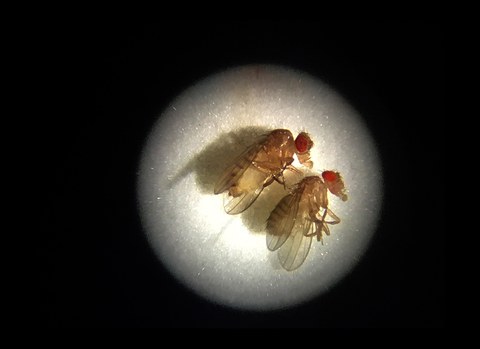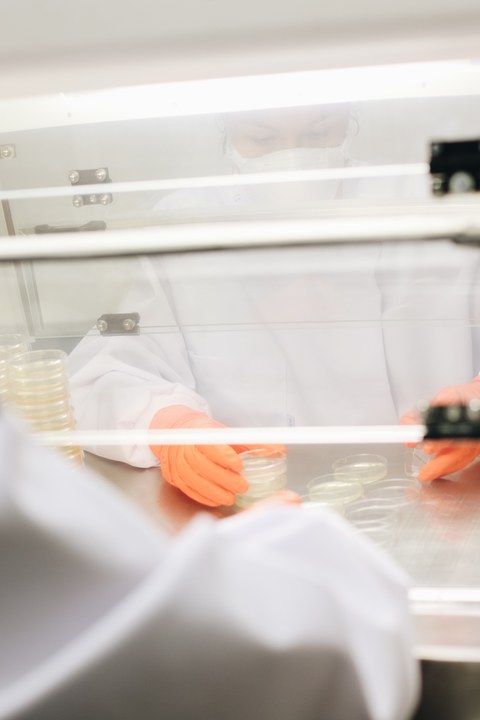Oct 01, 2019
Microbes as a possible key to biological pest control

Scientific model fruit fly (Drosophila melanogaster, above) and the plant pest cherry vinegar fly (Drosophila suzukii, below)
Progress in interdisciplinary research project on fruit flies
Since 2018, the DFG-funded interdisciplinary research team FOG 2682 led from the Biotechnology Center (BIOTEC) at the TU Dresden has been investigating the basic principles of insect adaptation to temperature fluctuations in the environment. The project group with scientists from seven different research institutions in Germany found out that insects have a temperature-dependent feeding behaviour. It is only through this behaviour that they can adapt their organism to environmental factors. Moreover, the quality of the food and the microbes involved are also temperature-dependent. Manipulation of the microbes could therefore be a natural method of pest control.

How do microbes affect fruit flies? Investigations in the new laboratory area at BIOTEC
In autumn, a new laboratory area specially adapted to the work of the research team will be available at BIOTEC. Microbial compositions in field samples can then be identified and their influence on fruit flies can be investigated directly. In addition, the project group aims to substantially expand its research in order to elucidate the molecular adaptation of fruit flies to temperature extremes. The focus will then be on several new questions: How and for how long can fruit flies freeze and start a new generative cycle after defrosting? Are certain microbes responsible for making fruit flies heat-resistant? What role do biophysical properties of individual molecules play in changing the temperature sensitivity and metabolism of animals? To elucidate these possible future directions, there will be the third annual meeting of the entire research team and invited renowned international experts will take place at the Julius Kühn Institute in Pirna in spring 2020.
Publications:
Selective phosphorylation of AKT isoforms in response to dietary cues. Laura Christin Trautenberg, Elodie Prince, Cornelia Maas, Nora Beier, Freya Honold, Michal Grzybek, Marko Brankatschk. Front. Cell Dev. Biol. bioRxiv 693242; doi: https://doi.org/10.1101/693242
Population Genetic and Functional Analysis of a cis-Regulatory Polymorphism in the Drosophila melanogaster Metallothionein A gene. Timothy J. S. Ramnarine, Amanda Glaser-Schmitt, Ana Catalán and John Parsch. Genes (Basel). 2019 Feb 14;10(2). pii: E147. doi: 10.3390/genes10020147.
A Temperature-Dependent Switch in Feeding Preference Improves Drosophila Development and Survival in the Cold. Marko Brankatschk, Theresia Gutmann, Oskar Knittelfelder, Alessandra Palladini, Elodie Prince, Michal Grzybek, Beate Brankatschk, Andrej Shevchenko, Ünal Coskun, and Suzanne Eaton. Dev Cell. 2018 Sep 24;46(6):781-793.e4. doi: 10.1016/j.devcel.2018.05.028.
Visualization of ligand-induced transmembrane signaling in the full-length human insulin receptor. Theresia Gutmann, Kelly H. Kim, Michal Grzybek, Thomas Walz, Ünal Coskun. The Journal of Cell Biology May 2018, 217 (5) 1643-1649; DOI: 10.1083/jcb.201711047
Media inquiries:
Dr. Marko Brankatschk
Tel.: 0351 463-40111
www.tu-dresden.de/biotec/research/brankatschk
The Biotechnology Center (BIOTEC) was founded in 2000 as a central scientific unit of the Technische Universität Dresden (TU Dresden) with the goal of combining modern approaches in molecular- and cell biology with the traditionally strong engineering in Dresden. Since 2016 the BIOTEC is part of the central scientific unit “Center for Molecular and Cellular Bioengineering” (CMCB) of the TU Dresden. The BIOTEC is fostering developments in research and teaching within the Molecular Bioengineering research field and combines approaches in cell biology, biophysics and bioinformatics. It plays a central role within the research priority area Health Sciences, Biomedicine and Bioengineering of the TU Dresden. www.tu-dresden.de/biotecwww.tu-dresden.de/cmcb
